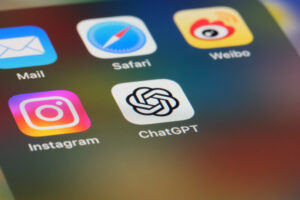As tech and digital recruiters, we know the importance of accepting and embracing new technology. And while AI isn’t new to the recruitment sector, recent evolutions of it are.
Generative AI such as ChatGPT is more advanced than the technology already adopted by our industry. Its ability to take human inputs and create something new means that it can quickly become a tool that improves both the efficiency and quality of recruitment work.
With this in mind, should recruiters be worried about being replaced by generative AI tools and their iterations?

The rise of AI in recruitment has caused concern about job security and the potential for AI to replace human recruiters. Even pre ChatGPT, 29% of recruitment professionals already believed that AI would replace them. And now, if you ask ChatGPT which job roles it will replace, ‘recruiter’ is in the top 20!
AI in recruitment. Some statistics.
Here are some statistics regarding the use of AI in recruitment.
- 60% of respondents to a recent survey confirmed that their organisation currently uses AI for talent management.
- 44% of people believe that AI will free up the recruiter’s time.
- 79% of recruiters think that artificial intelligence will soon be advanced enough to hire applicants and fire employees.
- 49% of people claim that AI in recruitment will be the most useful to the IT sector.

Is AI a threat to recruitment?
Not really.
In fact, AI can be a powerful tool to help recruiters become more efficient and effective. If tasked correctly, it can perform the more time-consuming and laborious areas of our work. CV screening, candidate sourcing, and some aspects of candidate engagement can all be delegated to AI.
Artificial intelligence also has the potential to eliminate up to 75% of unsuitable applicants even before the screening process begins. Its ability to create a faster and more accurate hiring timeline means its work has a very positive impact on the candidate journey.
This ability to streamline the recruitment process creates more time for the human aspect of our work such as building relationships with clients and candidates.

The limitations of AI.
There are concerns regarding the overuse of AI in recruitment.
The crucial human touch.
Despite procedural positives, the human element remains crucial to candidates having a fair assessment. Only 34% of candidates would allow AI to decide whether or not they are suitable for a new position. If there’s a person involved, that number grows to 75%. This statistic successfully demonstrates how much candidates value human input.
There are also concerns that Artificial Intelligence overlooks atypical qualities and alternative experiences. Unable to account for these diversities, it’s probable that candidates will never be 100% comfortable with an entirely AI-led recruitment process.
How can AI be used to improve recruiter efficiency?
Knowing that our work as human recruiters is valued by candidates will hopefully give us the confidence to work with, rather than against Generative AI. As recruiters, our intention is to provide the best possible service for our candidates and clients.
Here are some ways we can use ChatGPT to enhance our work.
Copywriting.
We can use it to help us write engaging and accurate job ads. When recruiting for a new role, we spend a lot of time and energy on getting the right things across in our job ads. Using effective prompts, we can use ChatGPT to do this for us.

Candidate sourcing.
Once we have the job advert in place, we can ask Generative AI to come up with a Boolean search string for this job.
Candidate screening.
We are able to ask ChatGPT to come up with a series of screening questions that may help us shortlist candidates against the requirements of the role.
If we are new to recruitment or working on a particularly complex tech role, it may also help us with what a great answer might look like. Some tech roles are very niche, and as recruiters, we may not always be up to date with the latest tech trends and tools.

Business development.
Generating new business is another possibility for AI in recruitment. Recruiters can ask generative AI to scribe introductory emails based on prompts including tone, the content of the email, and our area of expertise.
AI can be adapted and tweaked.
Its ability to respond to human input, allows recruiters to tweak and adapt Generative AI prompts. These alterations mean the exchange is reactionary to create what you need. By playing around with the tool, you can alter the questions and prompts going into more detail to get what you need.

AI and candidates.
So, if recruiters are able to use generative AI to help us in our work, can’t candidates do the same thing?
Yes, they can. Generative AI can of course be used to write and manipulate a CV.
But that too is a plus for the human element of recruitment. The responsibility of recognising which candidates are truly experienced and fit for the job as opposed to which ones prompted a great CV is still on us as recruitment professionals.
The recruitment industry and its processes might continue to change in the coming years thanks to progressive technologies and tools, but it will still require the human element as part of effective decision-making.

Generative AI and recruitment.
Some takeaways.
Although AI has the ability to streamline recruiter efficiency and increase productivity, it will never be able to replace or replicate the human touch of recruitment.
AI can be used for a variety of recruitment tasks such as creating job adverts, creating candidate search strings, and business development.
The development of this technology means it’s crucial that recruiters adapt and focus on different tasks, such as candidate management and recognising genuine skills and experience.
Do you want more news and trends from the recruitment industry?
Head to the Industry News section of our blog.
It’s full of tips to help you become the best recruiter you can be and other IT sector recruitment news.





